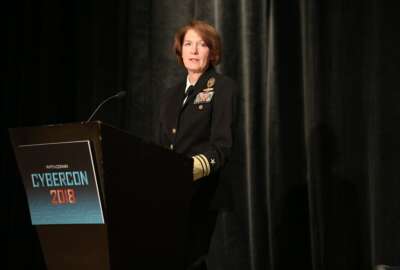
Marine Corps ‘in with both feet’ for DoD’s new cyber pay and personnel system
The Marine Corps plans to convert all of the civilian billets within its cyber command to the new Cyber Excepted Service starting next month.
Three and a half years after Congress authorized a brand new pay and personnel system to help the DoD fight an ongoing contest for cyber talent, the Marine Corps is leading the charge in finally bringing meaningful numbers of personnel into the system.
In its rollout plan for the Cyber Excepted Service, the Pentagon designated the military services’ cyber components as part of “phase two,” and the Marines plan to declare initial operating capability on their use of the new authorities next month. At that point, substantially all of Marine Corps Forces Cyberspace Command’s (MARFORCYBER) open civilian cyber positions will be converted to CES.
“We’re in with both feet,” Gregg Kendrick, the executive director of MARFORCYBER said at the annual Sea-Air-Space exposition in National Harbor, Md. last week.
The law authorizing the new system — which sets up market-based pay scales and faster hiring authorities — also gives existing employees the option of whether to move to CES or stay in the traditional competitive service. But Kendrick said MARFORCYBER would also be sending letters to its entire civilian cyber workforce urging them to convert.
The Pentagon has acknowledged that the early implementation phases of the new system – at U.S. Cyber Command, the Defense Information Systems Agency, the DoD CIO’s office and the Joint Force Headquarters-DoD Information Networks — has been slower than initially hoped for. As of March, just over 400 positions had been converted to CES across the entire department.
But the Marines may be better positioned to hit the ground running now that DoD is moving the authority to use the system down to the service level. That’s partly because they had already begun hiring civilian employees outside of the traditional USAJobs process and using alternative pay plans by cobbling together more than 20 existing legal authorities.
“We worked with the Office of Personnel Management over the last several years on the civilian side of the house,” Kendrick said. “In regards to the Defense Civilian Intelligence Personnel System, we have additional pay and authorities in regards to relocation, recruiting and retention of the personnel to a certain pay scale. Under the General Schedule, It’s a different pay bump — we can offer up to 50% to be able to bring people in above the GS pay scales.”
But for the Marines, that mix of authorities will all be consolidated into the Cyber Excepted Service starting next month, Kendrick said.
“What that really does is it brings these over 20 different hiring authorities and all these occupational fields together,” he said. “So think of it as bringing in all the authorities underneath the Marine Air Ground Task Force commander or the amphibious task force commander or the carrier strike group commander. It’s seamless, and it’s going to make a lot better warfare commander, regardless of service across the board to be able to increase readiness, lethality and capacity.”
The Marines are also slightly more reliant on civilians to fill out their cyber teams than their sister services are: roughly 40% of the Corps’ portion of the Cyber Mission Force is civilian. That was a conscious decision, Kendrick said, because the service wanted to preserve its limited military billets for other core portions of its force structure.
The Marines also intend to create a Cyber Auxiliary as a way to attract outside civilian cyber expertise without formally bringing those experts onto the government payroll.
Gen. Robert Neller first announced the initiative at a conference last month. The Marines Corps followed up with a brief statement on Tuesday that said the volunteer program — dubbed “Cyber Aux” — would make use of civilians with advanced cyber skills willing to teach and mentor the Marines’ own cyber personnel. They will work mostly in training settings, and will not be allowed to conduct “hands-on cyber activities.”
But Kendrick said the plan began as an outgrowth of the Corps’ civilian hiring efforts.
“We have a pretty big stake in [CES], but the commandant looked at that and said, ‘Well, how can I get those best business practices from other areas that maybe want to come join me but still want to work for Google or another software developer or a transport developer? So that’s where we want to go with the cyber auxiliary.”
The Navy is also on an aggressive timetable to move the civilian positions in its cyber service component — Fleet Cyber Command — to the excepted service. Under an implementation plan being administered by U.S. Fleet Forces Command, it intends to convert all of the eligible positions within Fleet Cyber Command to CES by August.
Following that phase, “core” cyber workforce positions across the rest of the Navy are expected to start moving to CES in 2023, Navy spokesman Joseph Gradisher said.
“We are optimistic that the CES system will help in our recruitment efforts, as we plan to use all of the authorities available to us and hire to our cyber positions as expeditiously as possible,” he wrote in an email to Federal News Network.
But the Navy is also making moves to develop dedicated cyber career paths for its uniformed members. Last year, it implemented a new Warrant Officer 1 paygrade for prior-enlisted sailors with between six and twelve years of experience in the field.
“These will allow our more junior level enlisted personnel who are skilled in that area to basically apply themselves in an officer-like category, with greater pay and more focused training,” said Vice Adm. Matthew Kohler, the deputy chief of naval operations for information warfare. “We also established the Cyber Warfare Engineer officer track that started initially with officers that would run in that specialty for about a five year track before they would come into a normal designator, and we’ve now created an entire track that would take them all the way up through Captain.”
Copyright © 2025 Federal News Network. All rights reserved. This website is not intended for users located within the European Economic Area.
Jared Serbu is deputy editor of Federal News Network and reports on the Defense Department’s contracting, legislative, workforce and IT issues.
Follow @jserbuWFED
Related Stories

Amid growing need for civilian cyber experts, DISA still isn’t using hiring authorities to the fullest extent




